Have you ever noticed your Bengal cat drooling like a baby? This behavior might not be just a quirk. It could be a sign of their health. Bengal cats can drool when they are very happy or when they are not feeling well. It’s important to know the difference. This guide will help you understand why your cat might be drooling and how to help them stop.
Key Takeaways
- Drooling can indicate both contentment and stress in Bengal cats.
- Dental issues are a common culprit behind excessive drooling.
- Exposure to toxins requires immediate veterinarian attention.
- Routine dental checkups can prevent health problems related to drooling.
- Recognizing the context of your cat’s drooling is essential.
Introduction to Bengal Cat Drooling
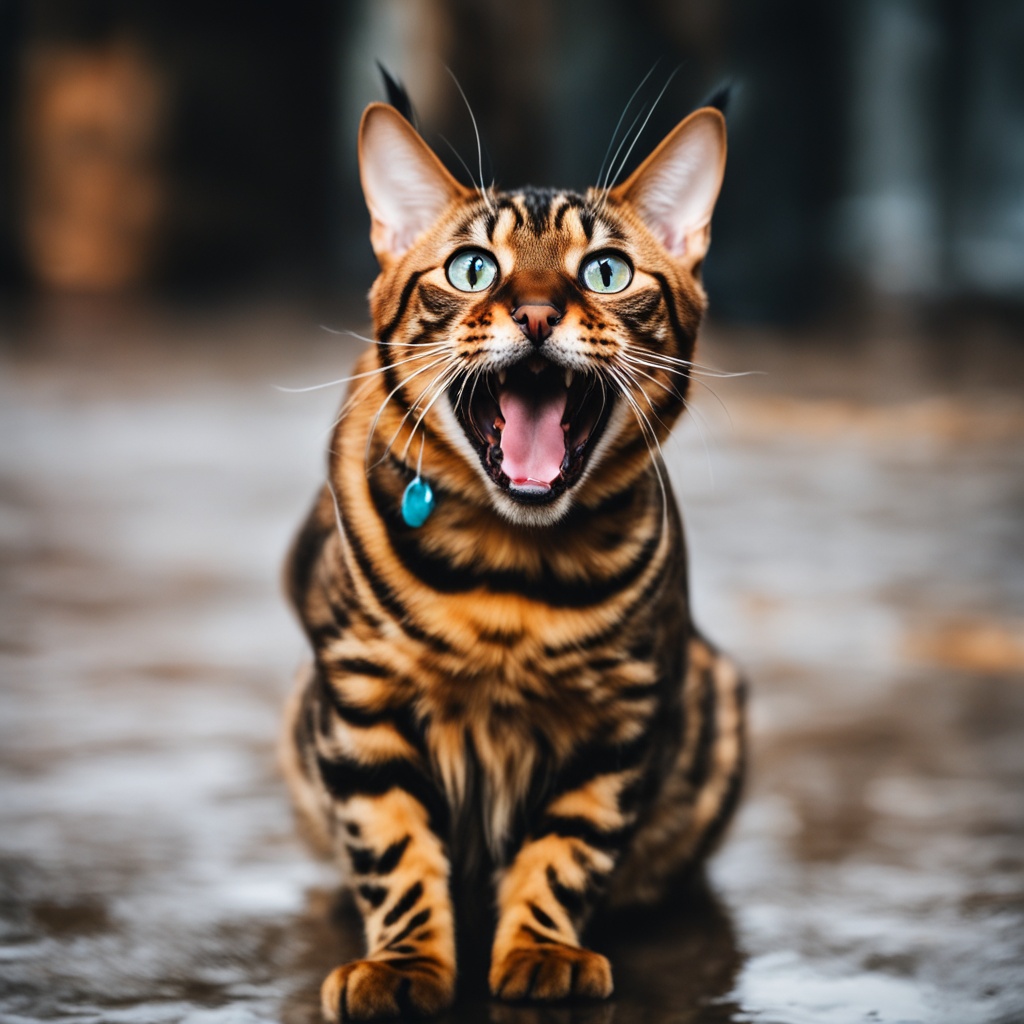
Ever thought about Why Does My Bengal Cat Drool? This drool mystery can surprise and interest us. Sometimes, you might see it as love. Other times, too much drooling can mean your Bengal has health issues.
There are lots of reasons for all that saliva. Figuring out if the drooling is normal or a concern is key. This can help keep your Bengal happy and healthy.
Sometimes, drooling shows pure happiness – much like a dog’s tail. But, it can also point to problems like bad teeth or diseases. These can make your Bengal cat drool more than usual.
Understanding why your Bengal cat drools is important. It helps you tell if it’s cute or a sign of trouble. Finding out Why Does My Bengal Cat Drool? can lead you to spot health problems early. This keeps your Bengal not just looking good but feeling good too.
Common Reasons Why Bengal Cats Drool
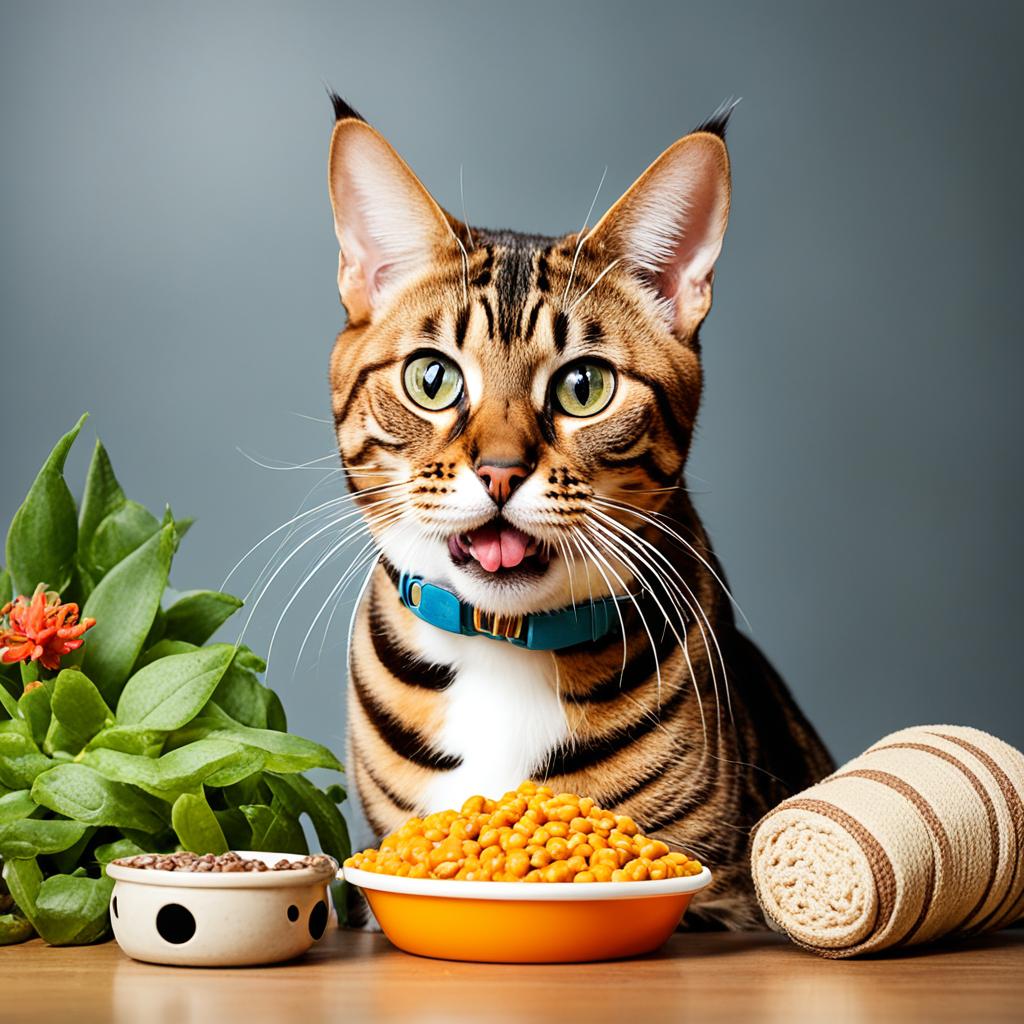
Bengal cats might drool for various reasons. It’s key to know why to keep your pet healthy. Let’s look at common causes and how to deal with them:
Contentment and Relaxation
It might surprise you that one reason Bengals drool is happiness. Just as you shed a tear at a beautiful scene, Bengals might drool when they feel comfy. This can happen while they knead or purr on your lap.
Stress and Anxiety
Stress and anxiety can also make Bengal cats drool. Things like going to the vet or moving can stress them out. It helps to know what upsets your cat to stop the drooling due to stress.
Exposure to Toxins
Being around toxins is very dangerous and can make Bengal cats drool. Stuff like some plants, chemicals, or certain foods is bad for them. If you think your cat has been around a toxin, see a vet right away.
| Scenario | Indicators | Action |
|---|---|---|
| Contentment | Purring, kneading | Enjoy the moment! |
| Stress | Hiding, nervous behavior | Create a calm environment |
| Exposure to Toxins | Vomiting, lethargy | Visit the vet immediately |
Being aware of what makes Bengal cats drool and how to fix it is important. Acting early to stop drooling makes your cat happier and healthier. It’s all about keeping your little friend calm and secure.
Dental Health Issues in Bengal Cats

Keeping your Bengal cat’s teeth in good shape is key for its health. Problems like bad breath, discolored teeth, and bloody drool may show up. These signs mean your cat needs to see a vet fast.
Gum disease is a big issue for Bengal cats. It can cause a lot of pain and even make them lose teeth. Tooth resorptive lesions are also common, causing discomfort and extra drooling.
To fix these issues, your cat might need a deep dental clean or tooth removal while asleep. Getting regular vet check-ups can stop dental problems early, keeping your cat happy and healthy.
| Common Issue | Symptoms | Treatment |
|---|---|---|
| Gum Disease | Bad breath, inflamed gums, drooling | Professional cleaning, possible extractions |
| Tooth Resorptive Lesions | Discolored teeth, pain, drooling | Extractions under anesthesia |
Being proactive about your Bengal cat’s dental health can lower the risks. This way, your cat can live a pain-free life, without the worry of oral diseases.
Why Does My Bengal Cat Drool?
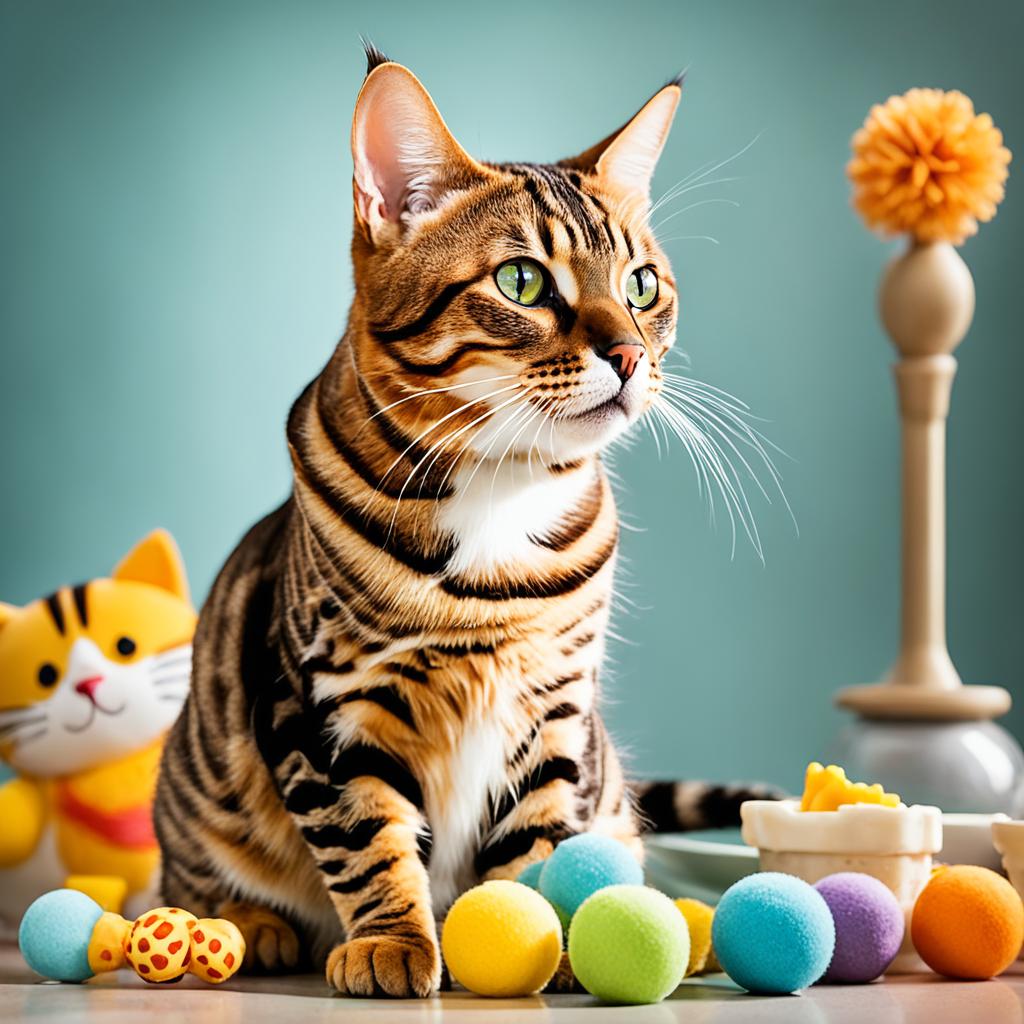
Ah, the mystery of your Bengal cat’s drooling! You might think, why does my Bengal cat drool? Well, there are a few reasons, some simple and some more serious.
Looking into Bengal cat health issues, we find dental problems at the top of the list. Things like gingivitis and oral injuries can make your cat drool a lot. If their gums hurt, it can cause extra drooling. It’s like when something spicy makes you drool.
But, drooling can also be a sign of other health issues. Kidney disease, breathing problems, or issues with the stomach can all lead to too much saliva. So, it’s important to watch out for these signs.
If your Bengal seems happy and relaxed while drooling, it might be okay. They might just be showing love. Bengals often drool when they are super relaxed, especially when they’re purring or making bread.
Yet, drooling due to brain issues is a bit harder. Problems in the brain or nervous system can also cause drooling. In this case, seeing a vet right away is your best bet.
To sum up, Bengal cat health issues are the main cause of drool:
| Cause | Explanation | Action |
|---|---|---|
| Dental Diseases | Issues like gingivitis or tooth decay | See a veterinarian for dental care |
| Underlying Illnesses | Conditions such as kidney disease | Medical check-up and treatment |
| Neurological Disorders | Problems in nervous system | Immediate vet consultation |
| Contentment | Natural drooling when happy | Normal behavior, no action needed |
Behavioral Causes of Drooling
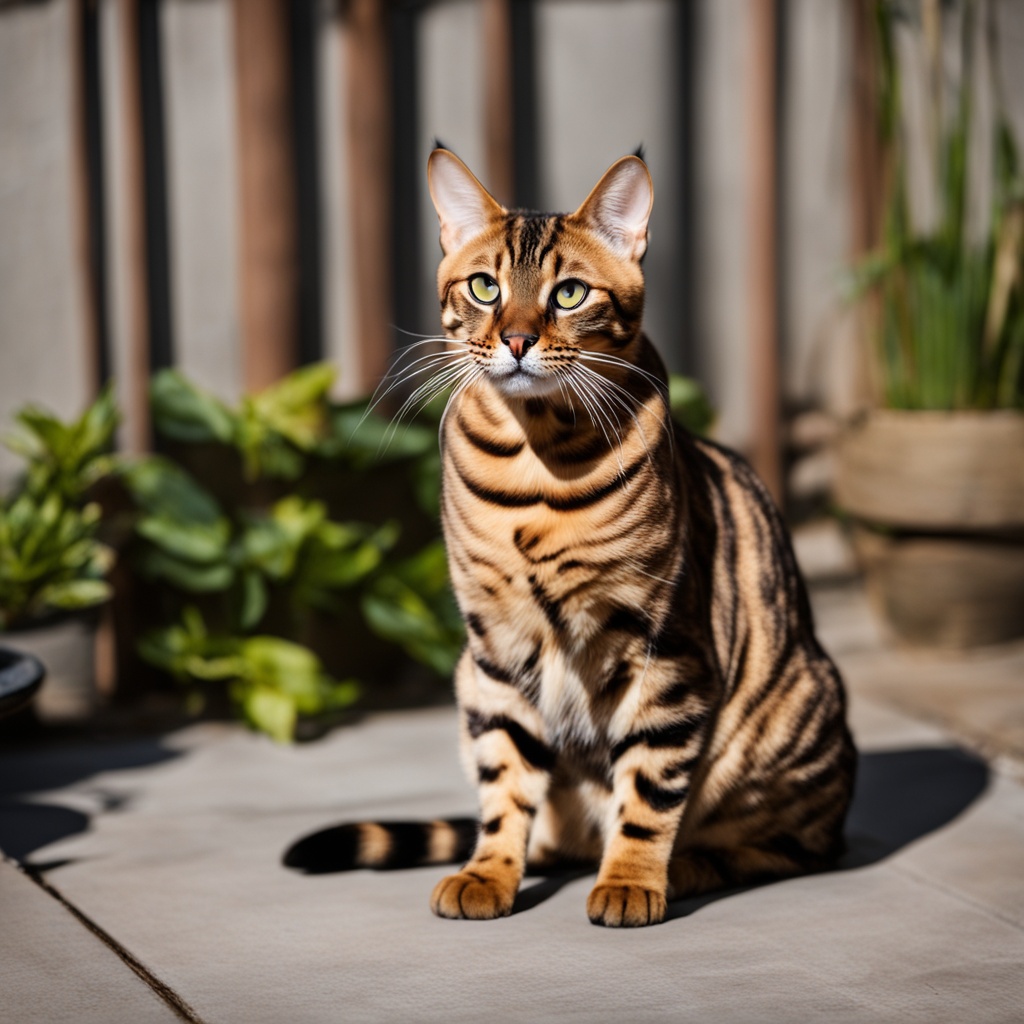
Bengal cats have unique behaviors that can lead to drooling. Knowing these traits can help lessen your cat’s drooling.
Association with Food
Bengal cats may drool when excited for food. The sound or smell of their meal can make them drip saliva. It’s like how Pavlov’s dog started to drool at the bell sound.
Positive Associations and Training
Creating happy links with training can make Bengal cats drool. For example, associating going into their carrier with fun outings might make them drool with excitement. Making their adaptation to new things gentle can also prevent drooling.
- Employ positive reinforcement techniques when training your Bengal cat.
- Gradual acclimatization to carriers and car rides can prevent stress-induced drooling.
- Ensure consistency in rewards to build strong positive associations.
Understanding and catering to Bengal cat behaviors can help cut down on their drooling.
Veterinary Care for Excessive Drooling
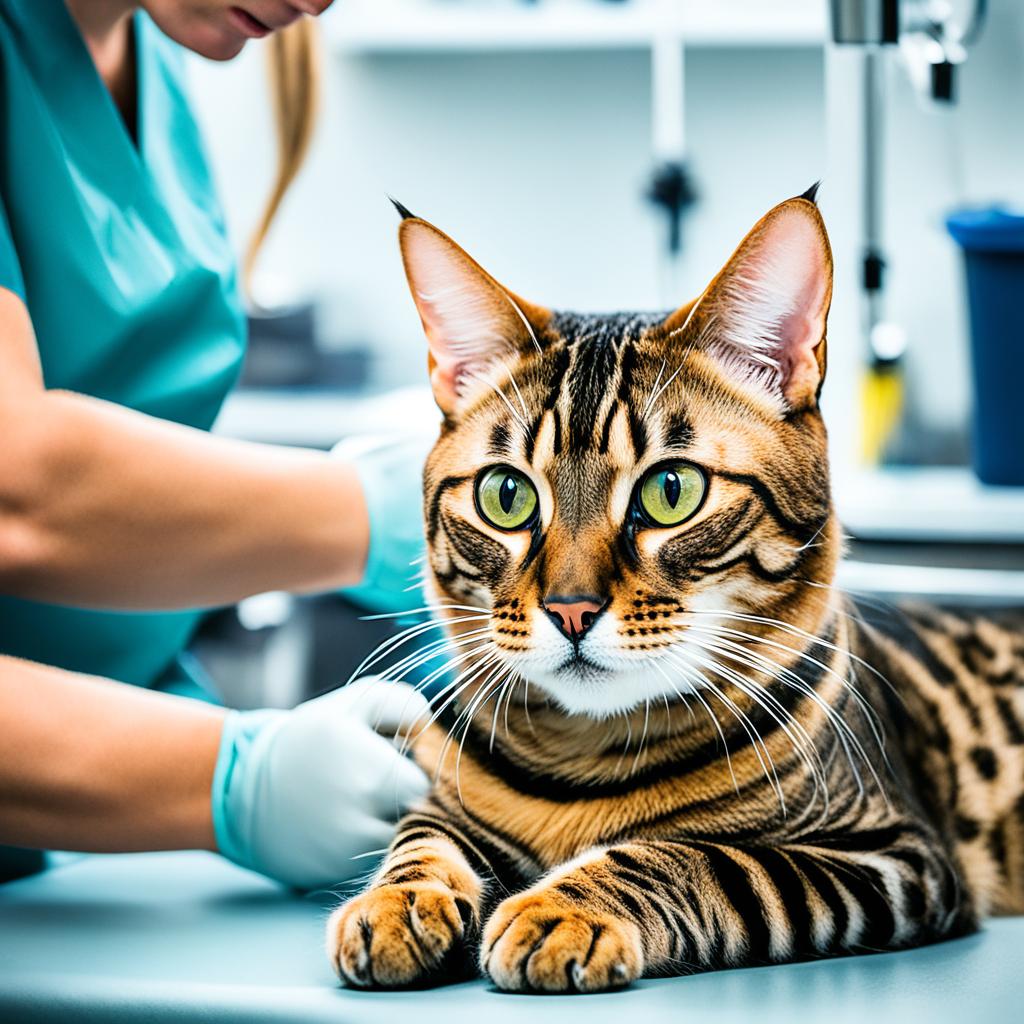
If your Bengal cat is drooling a lot, it’s good to see a vet. They are experts in handling your cat’s health. Addressing health issues quickly is key to keeping your cat happy and healthy.
Your vet will look into why your Bengal cat drools too much. They check for problems in the mouth and teeth. They can also find wider health issues. Understanding the cause is important for your cat’s overall health.
Here’s what a typical veterinary visit might entail:
- Detailed oral and dental checkup
- Prescription of necessary medications
- Recommendations for further diagnostics
- Suggested treatment plans for underlying conditions
Getting veterinary care for Bengal cats early is crucial. A quick visit can really help in treating your cat. Timely action is essential for their health.
Preventing Bengal Cat Drooling
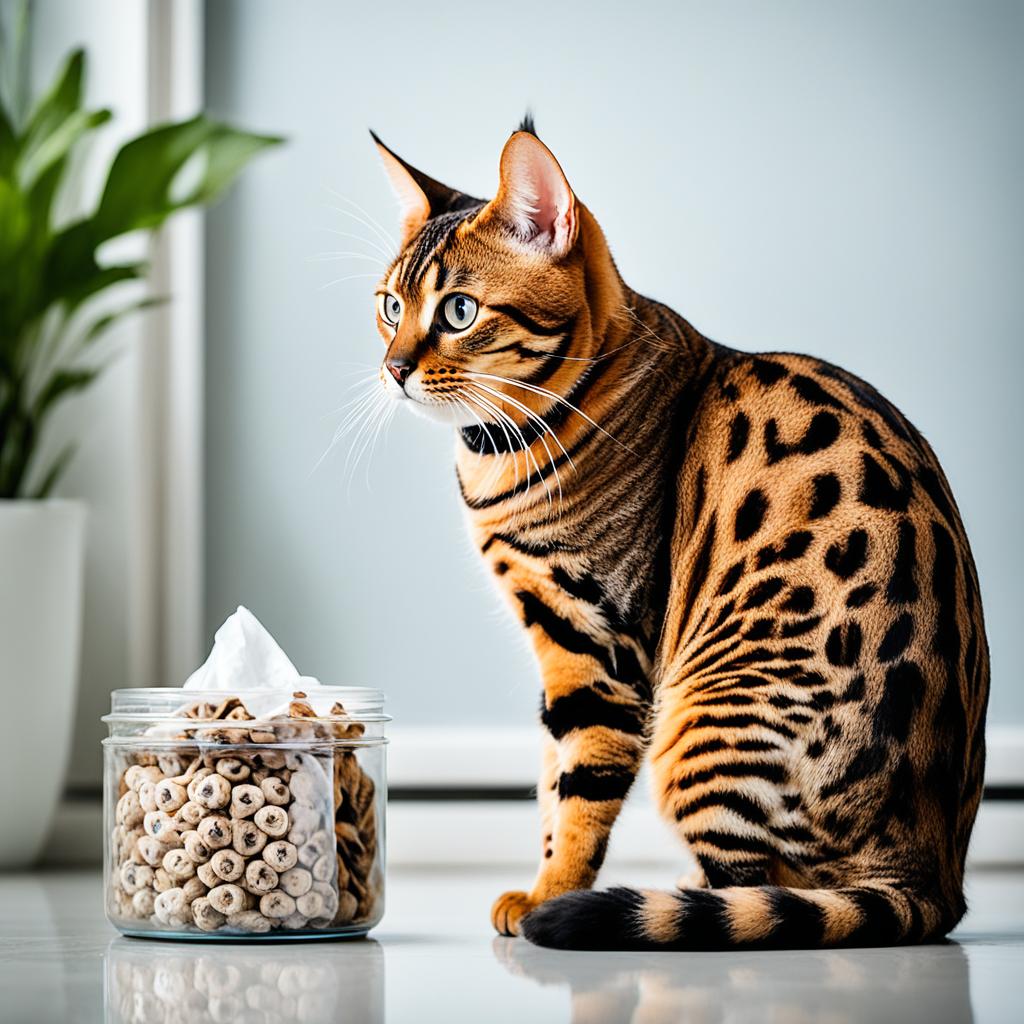
To stop Bengal cat drooling, it’s important to focus on their health and reduce stress.
Routine Dental Checkups
Regular dental checkups help keep Bengal cats from drooling too much. These checkups catch dental problems early. This stops drooling caused by tooth issues.
Stress Management Techniques
Reducing stress is another way to help your Bengal cat drool less. Stress can make them drool more. Creating a peaceful environment and using rewards can lower their stress.
Addressing Health Issues Leading to Drooling
When it comes to Bengal cats and their drooling, we need to look closely at health issues. Figuring out the causes is key. It can make a big difference in caring for your cat and making them feel good.
Oral Injuries and How to Detect Them
Oral injuries are a major reason for drooling in Bengal cats. Your cat might drool a lot if they have cuts or something stuck in their mouth. Look out for signs like panting, big eyes, or signs of pain. If you catch these early, you can get your cat to the vet fast.
Neurological and Systemic Diseases
Neurological and systemic diseases also cause a lot of drooling. These illnesses can disturb your cat’s normal life and make them drool more. If your cat drools a lot and shows other strange behaviors, like seizures, seeing the vet is critical.
| Health Issues | Symptoms | Action Required |
|---|---|---|
| Oral Injuries | Panting, Dilated Eyes, Hiding | Immediate Vet Check |
| Neurological Diseases | Seizures, Uncoordinated Movements | Comprehensive Veterinary Exam |
| Systemic Diseases | Unusual Behavior, Chronic Drooling | Detailed Health Assessment |
It’s very important to keep an eye on your cat’s health for drooling. Understanding symptoms is a big part of keeping your cat happy and healthy.
Managing Bengal Cat Drooling at Home
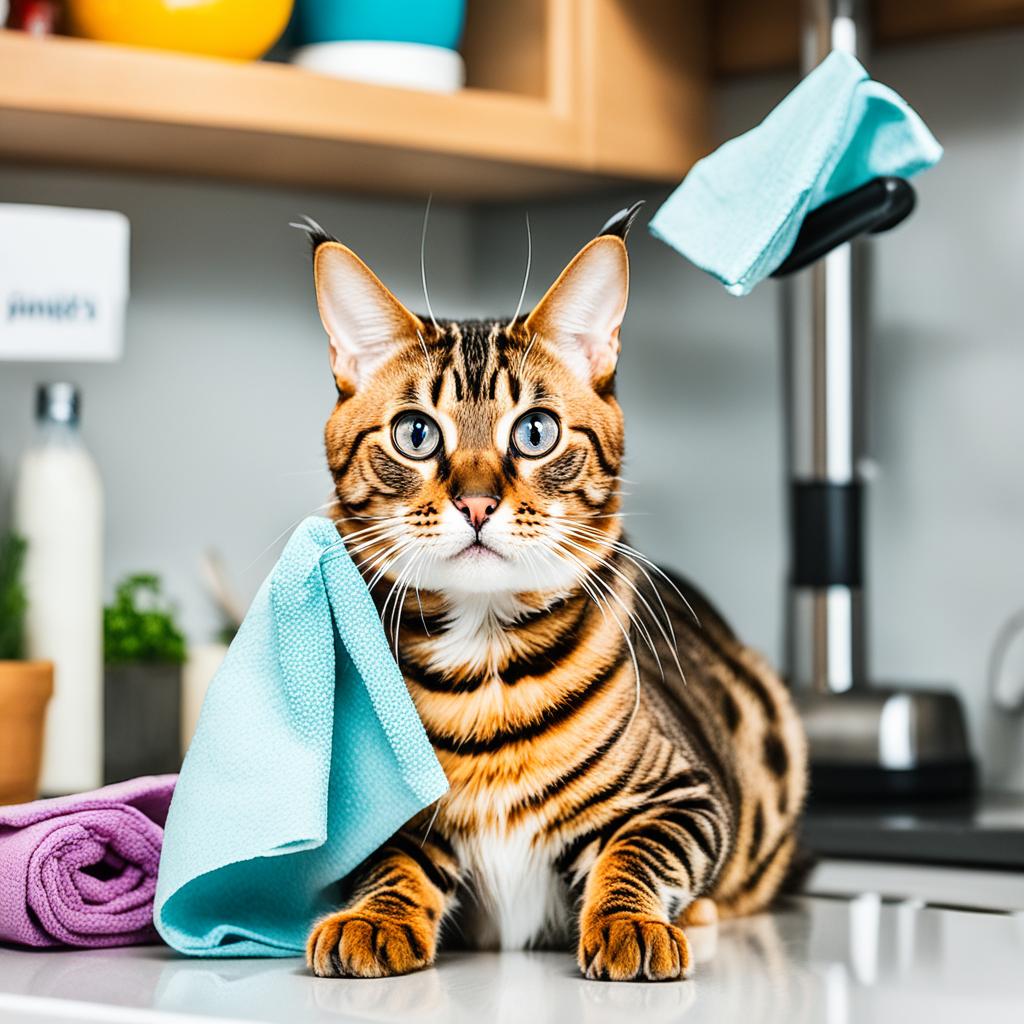
Dealing with Bengal cat drooling isn’t too hard. With the right steps, you can tackle or stop this issue. It’s all about finding what works best for your furry friend.
Home Remedies for Mild Drooling
For light drooling, simple home fixes can do wonders. Start by keeping their teeth clean through regular brushing. You might also give them cold snacks or toys. These can help ease any discomfort.
Is your cat drooling from nerves? Creating a peaceful spot for them is key. Add their favorite things there. And, make sure they get lots of your time and play. This can help reduce their stress and drooling.
When to Seek Emergency Care
Even with home care, some drooling needs a vet. If your cat looks unwell, with signs like being very tired, throwing up, or acting differently, it’s time to call. Acting fast can stop bigger health problems and keep your pet well.
How to Make Your Bengal Cat Comfortable
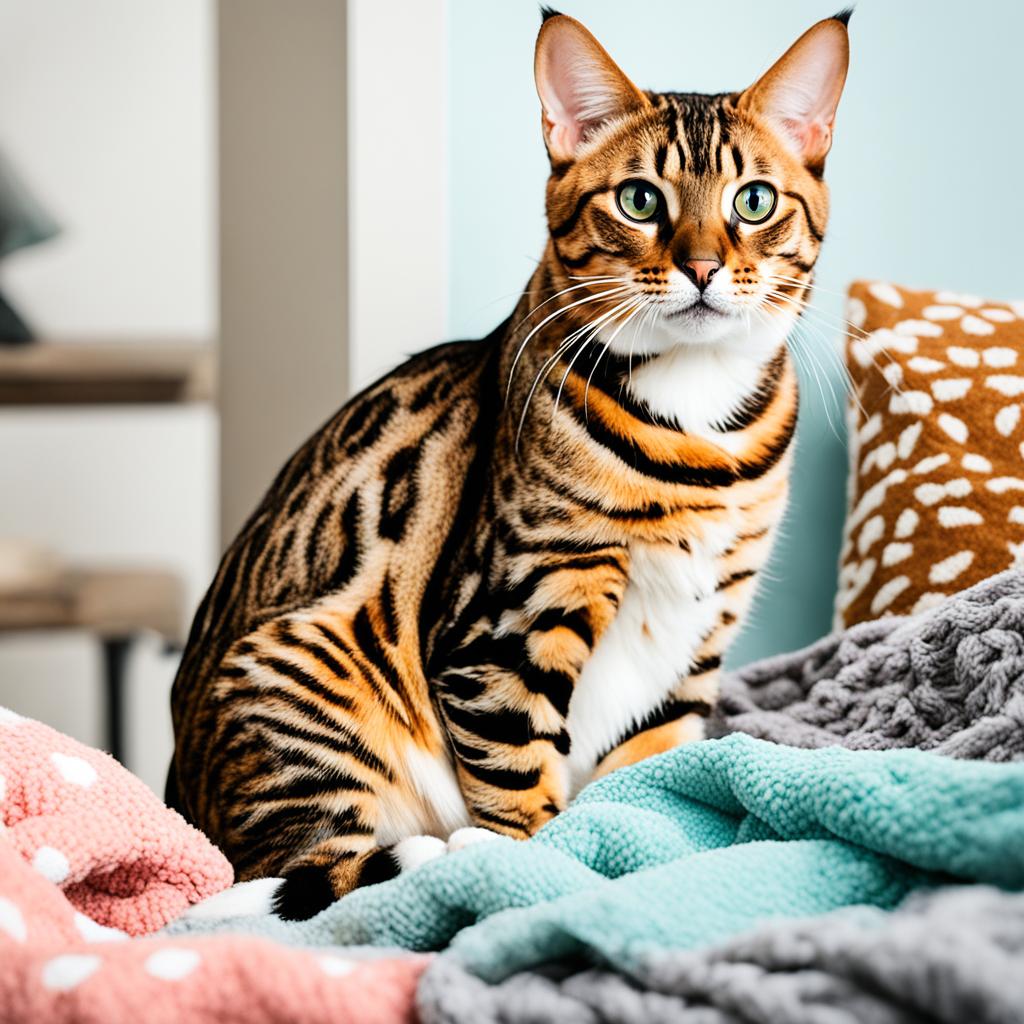
Making a snug spot for your Bengal cat is key to prevent anxiety and issues like drooling. Knowing your Bengal’s habits can be your best asset for a calm home.
Start with stress management techniques. It’s essential to have several quiet spots for your Bengal. Add soft beds or blankets in these spots for them to use when they need a break.
Handling changes at home is very important. Bengal cats can get upset easily by new things. If you’re moving furniture or adding a new pet, do it slowly. Use familiar smells with their toys or bedding.
Keeping to a set schedule is great for your Bengal. Stick to regular times for meals, play, and rest. This keeps them happy and avoids troubles for you both.
Interactive games are vital for Bengal cats. They love to play and explore. Use puzzle feeders, laser toys, and feathers to keep them sharp and active. This helps them stay calm.
In conclusion, knowing Bengal cat behavior and managing stress is key. A peaceful cat means a happy home for everyone.
Conclusion
The question, “Why Does My Bengal Cat Drool?” has a complex answer. It’s about looking at behavior, teeth, and health. To stop drooling, know your cat’s world, lessen stress, and visit the vet often.
Bengal cats are loved for being wild yet loving. They may drool when comfy or anxious. This drooling could be from happiness or a health problem. Observe their behavior and take care of their teeth to reduce drooling.
To manage Bengal cat drooling, take steps before it starts. Pay attention to your cat’s behavior. This way, you can help your cat be happy and healthy. Remember, a well-loved cat is a healthy cat!




